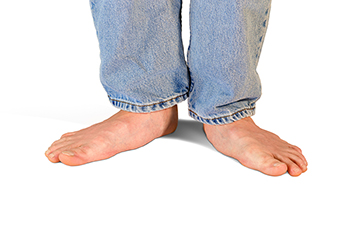
Fallen arches is a condition that is termed posterior tibial tendon dysfunction, or PTTD. It also may be referred to as adult-acquired flat feet. Many people with flat feet suffer little or no problems. But others may experience pain if a tendon in the arch of the foot becomes inflamed, overstretched, or torn. The problem starts with the posterior tibial tendon, which begins in the leg, runs through the ankle, and connects to the bones in the bottom of the foot. When it is damaged, it can result in flat feet. This type of occurrence is far more prevalent in women, especially those between 40 and 60 years old. It is believed to be the result of overuse of the posterior tibial tendon. It is also common among runners and athletes who play high-impact sports. Other causes include diabetes, obesity, and high blood pressure. Symptoms include pain on the inside of the foot and ankle, accompanied by swelling, redness, and warmth. Symptoms usually spike after engaging in physical activity, such as jumping and running. For more information on this type of injury, it is suggested that you make an appointment with a podiatrist.
Flatfoot is a condition many people suffer from. If you have flat feet, contact one of our podiatrists from Pennsylvania. Our doctors will treat your foot and ankle needs.
What Are Flat Feet?
Flatfoot is a condition in which the arch of the foot is depressed and the sole of the foot is almost completely in contact with the ground. About 20-30% of the population generally has flat feet because their arches never formed during growth.
Conditions & Problems:
Having flat feet makes it difficult to run or walk because of the stress placed on the ankles.
Alignment – The general alignment of your legs can be disrupted, because the ankles move inward which can cause major discomfort.
Knees – If you have complications with your knees, flat feet can be a contributor to arthritis in that area.
Symptoms
- Pain around the heel or arch area
- Trouble standing on the tip toe
- Swelling around the inside of the ankle
- Flat look to one or both feet
- Having your shoes feel uneven when worn
Treatment
If you are experiencing pain and stress on the foot you may weaken the posterior tibial tendon, which runs around the inside of the ankle.
If you have any questions please feel free to contact one of our offices located in Plymouth Meeting and Ambler, PA . We offer the newest diagnostic and treatment technologies for all your foot and ankle needs.
